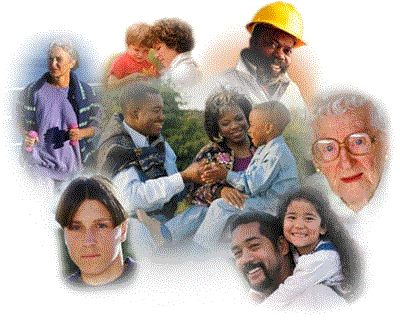Lesson 1: Foundations of Community Mental Health and Illness
Attention

Community Mental Health is about COMMUNITY!
Learning Outcomes
Upon completion of this lesson's material, students will be able to:
- Define community, community mental health, mental health, and mental illness.
- Describe the history of mental illness.
- Explain how community affects mental health.
Teaching
Lecture
Community mental health, while conceptually a new idea, has always been at the heart of mental health and helping individuals with mental illness.
Community mental health is a way to provide mental health treatment and support for people with mental illnesses. Community-based care is designed to decrease the need for more costly inpatient mental health care delivered in hospitals. Community mental health care may be more accessible and responsive to an individual's local needs because it is based in a variety of community settings rather than isolating patients and patient care in hospitals. Community mental health assessment, which has grown into a science called psychiatric epidemiology, is a field of research measuring rates of mental disorder upon which mental health care systems can be developed and evaluated (from http://www.minddisorders.com/Br-Del/Community-mental-health.html).
Click HERE to read the Wikipedia entry on Community Mental Health.
Read the brief article about the Community Mental Health Act of 1963 (click/touch link): Community Mental Health Act of 1963. This articles provides a bit of history around when community mental health services really began to expand in the United States.
Read the article about the 2013 White House Conference on Mental Health: President Obama's White House Conference on Mental Health.
 Blackboard Structure of Classes in the Mental Health Program
Blackboard Structure of Classes in the Mental Health Program
Each Lesson in this course is going to be outlined in a similar manner as this Lesson.
Each Lesson will have an Attention graphic, a Learning Outcomes section, a Teaching section, and a list of Assessment (quizzes and discussion) activites that you have to complete. These may include quizzes (questions that you enter directly into Blackboard through an online quiz), Assignments (these are papers that you create in a word processor or on your iPad and upload to a "Drop Box" in Blackboard), and Discussions (these are online forums where I will ask you to consider and discuss delicate and controversial topics). Discussions are primarily for the online students but all students will still see the Discussion questions.
Special Assignments relate to Essential Learning Outcomes for this course (an institution-wide initiative). Essential Learning Outcomes involve an college wide process to identify specific learning outcomes like oral presentation skills or critical thinking.
It is vital to your learning and your grade that you participate in EVERY aspect of the course.
Assessment
Lesson 1 Quiz (to be completed in Blackboard)
- What are your current thoughts on what Community Mental Health is? Have you had personal experiences accessing the community mental health system? Share what that experience was like for you.
- If physical/medical illness is treated as a "predictable" conseqence of heredity, family history, etc., and life-style choices, like career and environmental exposures, why does mental illness carry such a negative connotation? Heredity may equally play a role here as well as life-style choices. Share your thoughts on the reasons for the difference in perception between mental illness and medical illness.
Lesson 1 Discussion (for online students only)
To get full credit for the online graded discussions you need to post ONCE to the prompt and reply to at least TWO other students' posts. Your reply posts must be substantive in nature. See the grading rubric in the syllabus for more information. These instructions will apply to ALL graded discussions and will not be repeated.
Share your thoughts about the two article about the United State's goverment's steps to provide community mental health services to American's. Were you surprised by the dates when these acts were created and focused efforts to help individuals with mental illness occurred? Share any new information that you learned from these articles.